Samsung SSD 850 Pro (128GB, 256GB & 1TB) Review: Enter the 3D Era
by Kristian Vättö on July 1, 2014 10:00 AM ESTRandom Read/Write Speed
The four corners of SSD performance are as follows: random read, random write, sequential read and sequential write speed. Random accesses are generally small in size, while sequential accesses tend to be larger and thus we have the four Iometer tests we use in all of our reviews.
Our first test writes 4KB in a completely random pattern over an 8GB space of the drive to simulate the sort of random access that you'd see on an OS drive (even this is more stressful than a normal desktop user would see). We perform three concurrent IOs and run the test for 3 minutes. The results reported are in average MB/s over the entire time.
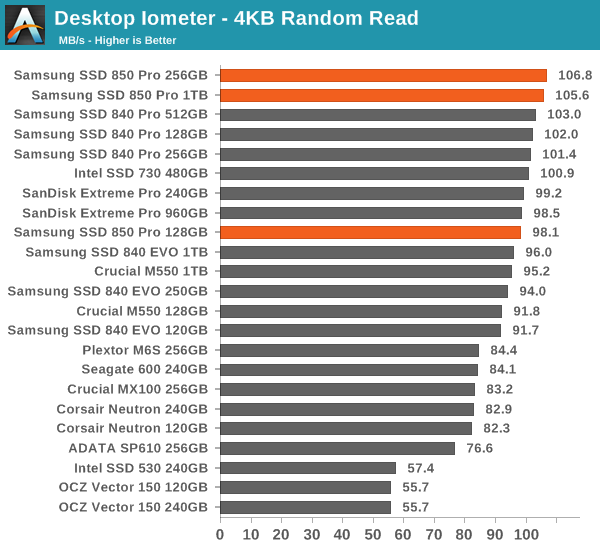
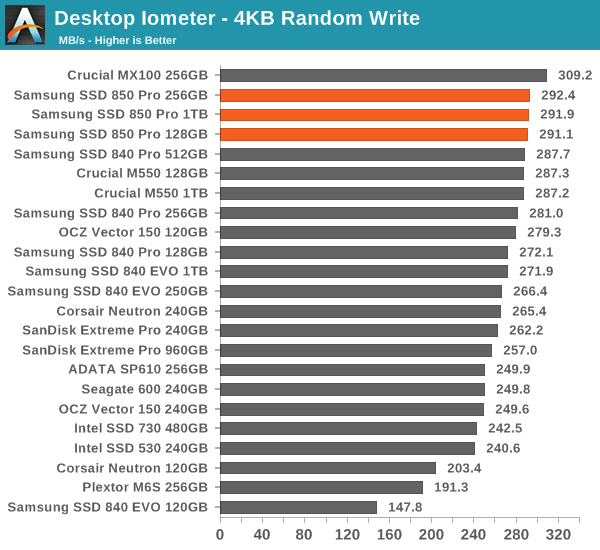
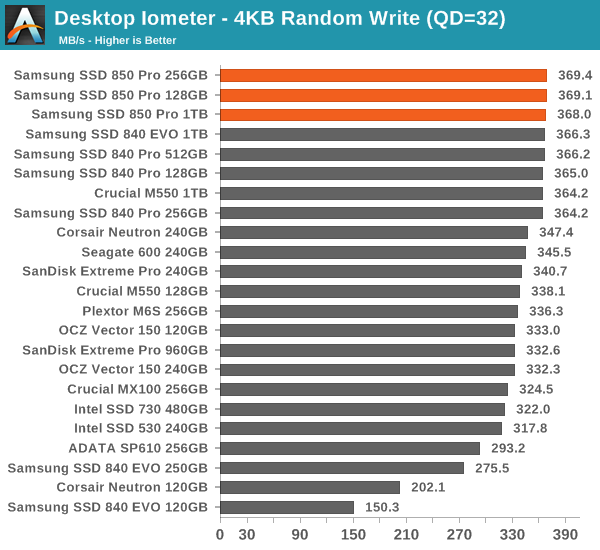
Random performance is also brilliant and the 850 Pro tops almost all of our benchmarks. It is no wonder why it is so fast in the Storage Benches.
Sequential Read/Write Speed
To measure sequential performance we run a 1 minute long 128KB sequential test over the entire span of the drive at a queue depth of 1. The results reported are in average MB/s over the entire test length.
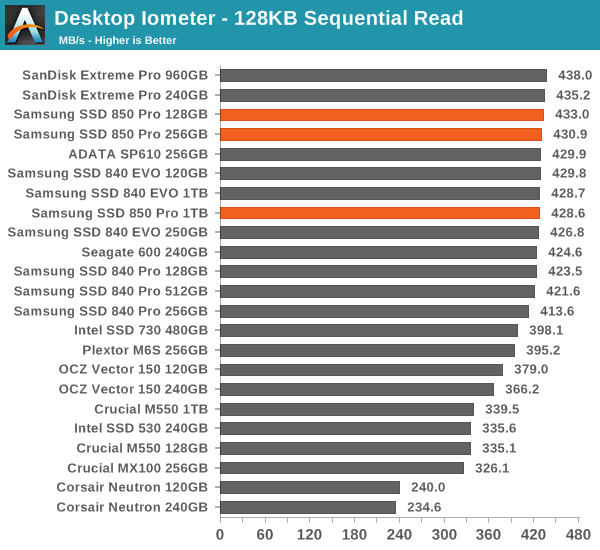
The same goes for sequential speeds. Of course, the differences are not substantial but nevertheless the 850 Pro is fast.
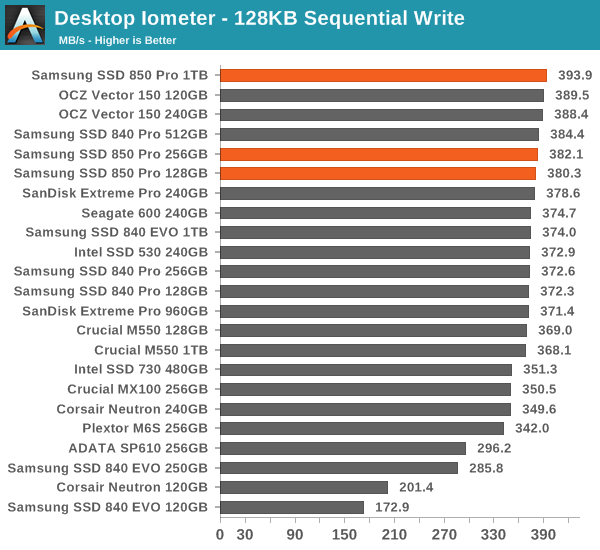
AS-SSD Incompressible Sequential Read/Write Performance
The AS-SSD sequential benchmark uses incompressible data for all of its transfers. The result is a pretty big reduction in sequential write speed on SandForce based controllers, but it doesn't impact most of the other controller much if at all.
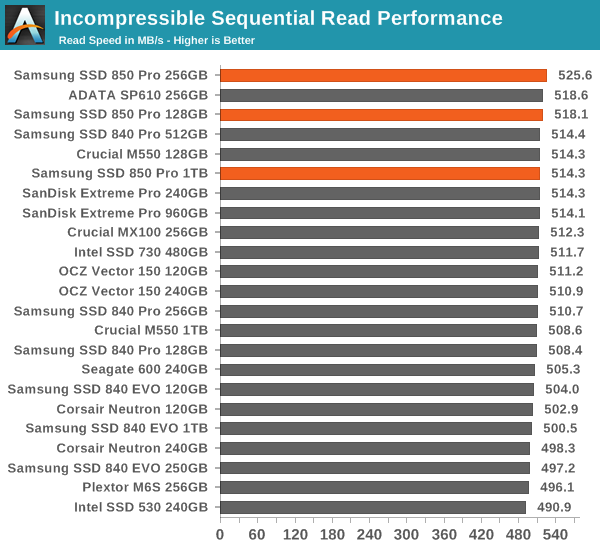
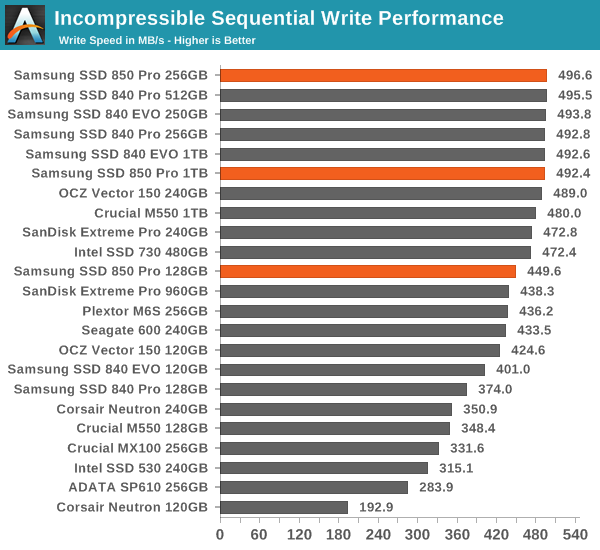










160 Comments
View All Comments
alacard - Monday, June 30, 2014 - link
Fascinating stuff, thanks for the in depth analysis.Iketh - Tuesday, July 1, 2014 - link
Good read on the software not taking advantage of SSDs yet. Windows is the biggest offender. I have 8 threads and an SSD and I still have to wait for each of my startup programs to load like a snail 1 at a time after bootup...tetsuo77 - Monday, June 30, 2014 - link
"There are some drops, although I am not sure what is causing them"It looks suspiciously like your values overflowed an unsigned int (prior to being converted from B to KB). Just add ~4.3 million to the 4 mysteriously low values and you have a nicely shaped curve.
tetsuo77 - Monday, June 30, 2014 - link
Oops.. I pasted the wrong quote. Meant to quote this: "It looks like read performance scales quite linearly until hitting the IO size of 256KB where RAPID stops caching"I maintain that there is an error in the numbers on the graph :)
Gigaplex - Tuesday, July 1, 2014 - link
32 bit unsigned integers support around 4.3 billion, not million.lyeoh - Friday, July 4, 2014 - link
if the values were being stored internally as bytes and not kilobytes it might overflow as tetsuo77 mentioned. 4.3 million * kilobytes per sec = billions of bytes/sec which could overflow.nirwander - Monday, June 30, 2014 - link
I cant see how they aim at mainstream with these prices.Crucial MX100 512 is already fast enough for SATA 6 Gbps and.. twice as cheap!
Technology geeks will probaly go for Intel PCIe NVMe drives.
Gigaplex - Monday, June 30, 2014 - link
And if you really need the performance, just get two of the MX100s and RAID 0 them.willis936 - Tuesday, July 1, 2014 - link
Unless you care about storage latency at all.Gigaplex - Tuesday, July 1, 2014 - link
Fair point, but SSDs are so far ahead of hard drives in terms of latency that it hardly matters.